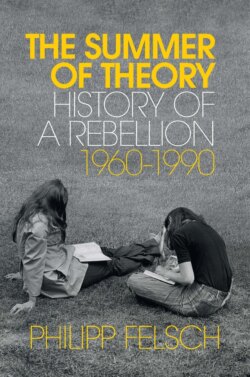The Summer of Theory

Реклама. ООО «ЛитРес», ИНН: 7719571260.
Оглавление
Philipp Felsch. The Summer of Theory
Table of Contents
List of Illustrations
Guide
Pages
The Summer of Theory. History of a Rebellion, 1960–1990
Copyright Page
Dedication
Illustrations
Acknowledgements
Introduction: What Was Theory?
Notes
1 FEDERAL REPUBLIC OF ADORNO
Reflections from Damaged Life
Culture after Working Hours
In the Literary Supermarket
Adorno Answers
Are Your Endeavours Aimed at Changing the World?
Notes
2 IN THE SUHRKAMP CULTURE
New Leftists
He Didn’t Write
School of Hard Books
Paperback Theory
Birth of a Genre
Notes
3 ILL-MADE BOOKS
Theoretical Practice
Smash Bourgeois Copyright!
Mondays, Fridays and Sundays
The Disorder of Discourse
Notes
4 WOLFSBURG EMPIRE
Proletarian Public Sphere
In the Land of Class Struggle
The Lightness of Being Communist
A Fateful Stroke of Luck
Notes
5 (POSSIBLE) REASONS FOR THE HAPPINESS OF THOUGHT
All Kinds of Escapes
Intensity Is Not a Feeling
The Laugh of Merve
Vague Thinkers
Notes
6 THE READER AS PARTISAN
The Death of the Author
The Pleasure of the Text
Children’s Books
A Different Mode of Production
Lying on Water
Notes
7 FOUCAULT AND THE TERRORISTS
A Schweppes in Paris
Political Tourists
Vermin
On Tunix Beach
Notes
8 CRITIQUE OF PURE TEXT
The Master Thinkers
Adults Only
Sola Scriptura
Aesthetics of Counter-Enlightenment
A Little Materialism
Notes
9 INTO THE WHITE CUBE
The Mountain of Truth
Be Smart – Take Part
German Issues
The Island of Posthistoire
The Trouble with Duchamp
Notes
10 PRUSSIANISM AND SPONTANEISM
War in the Time of Total Peace
Machiavelli in Westphalia
The Wild Academy
In Search of the Punctum
Jacob Taubes’s Best Enemy
Notes
11 DISCO DISPOSITIVE
Tyrannies of Intimacy
Pub Blather
The Art of Having a Beer
In the Jungle
Above the Clouds
Notes
Epilogue: After Theory?
Notes
Appendix: Translations of Illustrations
Bibliography. Archives
Author’s Interviews and Conversations
Audio and Video Recordings
Literature
Index
POLITY END USER LICENSE AGREEMENT
Отрывок из книги
PHILIPP FELSCH
Translated by Tony Crawford
.....
Neither Enzensberger nor Adorno could have imagined in 1959 that they would owe their own success as authors to the generation of paperback readers.50 Once Minima Moralia appeared in a soft cover in the early 1960s, no one carried it around in hardcover any more. Adorno later attained high sales figures in the various paperback series published by Suhrkamp. The new medium, which, from its critics’ perspective, ensured the conformance of the consumer, was supplying difficult ideas – initially as contraband – to a growing readership.51 The history of theory is not conceivable without these upheavals in the book market, and that is what makes Peter Gente, the book collector and book producer, such an exemplary figure in that history. It was the Penguin designer Hans Schmoller, a German-Jewish emigrant, who remarked in 1974 on the paradox of the ‘paperback revolution’: ‘though in the West paperbacks have become big business, this has not prevented their publishers from giving free rein to expressing ideas strongly opposed to established political and economic systems and indeed advocating their overthrow’.52
After having been forgotten for an interim, Adorno was omnipresent in the 1960s.53 He filled the lecture halls and appeared in the young mass media – most of all, radio, the German ‘counter-university’ of the post-war period.54 The barely modulated voice, separating its words with tiny pauses, was unmistakable. It was a hit with the audiences of the cultural programmes and the night-time airwaves. Learning by radio how to read Hegel: such breathtakingly highbrow content sends today’s cultural editors into raptures of nostalgia. It is hardly imaginable any more, Joachim Kaiser wrote for Adorno’s hundredth birthday, what influence the philosopher had in those days.55 At that time, when Kaiser himself fell under that influence, he described it in these terms: ‘Anyone writing, speculating, politicizing, aestheticizing today must engage with Adorno.’56 No one has held a comparable monopoly since. In the seventies, as Marxism grew sclerotic, Critical Theory submerged in the think-tank on Lake Starnberg – the Max Planck Institute for the Study of the Scientific-Technical World, whose second director was Jürgen Habermas – and the French came to dominate the theoretical airspace, another German generation grew accustomed to living in the philosophical provinces, dependent on onerously decrypted imports from a Mecca of theory across the Rhine. The Weltgeist didn’t live here any more.
.....